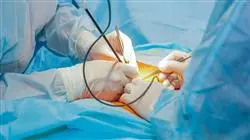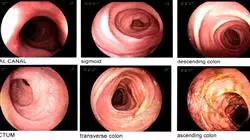University certificate
The world's largest faculty of medicine”
Introduction to the Program
The specialization of oncology professionals achieves improvements in the treatment of patients, so it is essential that they continue their specialization throughout their working life"

Rare digestive tumors include a heterogeneous variety of pathologies with very different diagnostic, therapeutic and prognostic approaches. According to the World Health Organization classification, the following tumors are included in this category: small bowel, Tumours appendicular, anal canal carcinoma, liver and intrahepatic bile duct tumors, gallbladder and extrahepatic bile duct neoplasms, and gastrointestinal stromal tumors.
In many cases, in the absence of clinical trials due to the small number of patients, therapeutic management is usually based on the extrapolation of existing data for neoplasms of similar location and higher frequency, as is the case with small bowel and colon cancer. However, more and more frequently, the molecular approach allows for effective treatment with targeted therapies, such as in the case of GIST (gastrointestinal stromal tumors) or more recently bile duct carcinomas. In this Postgraduate certificate there is a deep and exhaustive review of these subgroups of neoplasms, which will allow the student to handle a deep knowledge about this pathology.
On the other hand, this specialization also includes two other areas of knowledge: thyroid cancer and neuroendocrine tumors. Thyroid cancer is rare, accounting for less than 1% of all malignant tumors. Whereas neuroendocrine tumors constitute a heterogeneous group of tumors that are defined as epithelial neoplasms with predominantly neuroendocrine differentiation. Although the most frequent locations are the pancreas, digestive tract and lung, this type of neoplasm can arise in practically any organ of the body.
In this program, the experts, all of them referents in each area of knowledge, will develop aspects related to the context of this spectrum of pathologies, will present the clinical and molecular vision of the same, will show their diagnostic and therapeutic approaches and will explain complementary aspects such as their research and institutional environment or the global reality of the patients who suffer from them.
Students will be able to take the Postgraduate certificate at their own pace, without being subject to fixed schedules or the travel involved in classroom training, so they will be able to combine it with the rest of their daily obligations.
Learn about the latest developments in this type of pathologies and you will notice how you advance in your daily work"
The Postgraduate certificate in Uncommon Digestive Tumors. Digestive Neuroendocrine Tumors. Thyroid Cancer contains the most complete and up-to-date educational program on the market. The most important features of the specialization are:
- The development of case studies presented by experts in oncology
- The graphic, schematic, and eminently practical contents with which they are created, provide scientific and practical information on the disciplines that are essential for professional practice.
- News on rare digestive tumors, digestive neuroendocrine tumors and thyroid cancer
- Practical exercises where self-assessment can be used to improve learning.
- Special emphasis on innovative methodologies in the approach of this type of tumors
- Theoretical lessons, questions to the expert, debate forums on controversial topics, and individual reflection assignments
- Content that is accessible from any fixed or portable device with an Internet connection
This Postgraduate certificate is the best investment you can make when selecting a refresher program for two reasons: in addition to updating your knowledge, you will obtain a qualification endorsed by the main online university in Spanish: TECH”
Its teaching staff includes professionals belonging to the field of psychology, who bring to this specialization the experience of their work, in addition to recognized specialists from prestigious reference societies and universities.
Its Multimedia Content, elaborated with the latest Educational Technology, will allow the Professional a situated and contextual learning, that is to say, a Simulated Environment that will provide an immersive specialization programmed to train in real situations.
This program is designed around Problem Based Learning, whereby the specialist must try to solve the different professional practice situations that arise during the academic year. To do so, the professional will be assisted by a novel interactive video system developed by renowned and experienced experts in rare digestive tumors, neuroendocrine tumors and thyroid cancer.
This specialisation comes with the best didactic material, providing you with a contextual approach that will facilitate your learning"

This Postgraduate certificate 100% online course will allow you to combine your studies with your professional work while increasing your knowledge in this field"
Why study at TECH?
TECH is the world’s largest online university. With an impressive catalog of more than 14,000 university programs available in 11 languages, it is positioned as a leader in employability, with a 99% job placement rate. In addition, it relies on an enormous faculty of more than 6,000 professors of the highest international renown.

Study at the world's largest online university and guarantee your professional success. The future starts at TECH”
The world’s best online university according to FORBES
The prestigious Forbes magazine, specialized in business and finance, has highlighted TECH as “the world's best online university” This is what they have recently stated in an article in their digital edition in which they echo the success story of this institution, “thanks to the academic offer it provides, the selection of its teaching staff, and an innovative learning method aimed at educating the professionals of the future”
A revolutionary study method, a cutting-edge faculty and a practical focus: the key to TECH's success.
The most complete study plans on the university scene
TECH offers the most complete study plans on the university scene, with syllabuses that cover fundamental concepts and, at the same time, the main scientific advances in their specific scientific areas. In addition, these programs are continuously being updated to guarantee students the academic vanguard and the most in-demand professional skills. In this way, the university's qualifications provide its graduates with a significant advantage to propel their careers to success.
TECH offers the most comprehensive and intensive study plans on the current university scene.
A world-class teaching staff
TECH's teaching staff is made up of more than 6,000 professors with the highest international recognition. Professors, researchers and top executives of multinational companies, including Isaiah Covington, performance coach of the Boston Celtics; Magda Romanska, principal investigator at Harvard MetaLAB; Ignacio Wistumba, chairman of the department of translational molecular pathology at MD Anderson Cancer Center; and D.W. Pine, creative director of TIME magazine, among others.
Internationally renowned experts, specialized in different branches of Health, Technology, Communication and Business, form part of the TECH faculty.
A unique learning method
TECH is the first university to use Relearning in all its programs. It is the best online learning methodology, accredited with international teaching quality certifications, provided by prestigious educational agencies. In addition, this disruptive educational model is complemented with the “Case Method”, thereby setting up a unique online teaching strategy. Innovative teaching resources are also implemented, including detailed videos, infographics and interactive summaries.
TECH combines Relearning and the Case Method in all its university programs to guarantee excellent theoretical and practical learning, studying whenever and wherever you want.
The world's largest online university
TECH is the world’s largest online university. We are the largest educational institution, with the best and widest online educational catalog, one hundred percent online and covering the vast majority of areas of knowledge. We offer a large selection of our own degrees and accredited online undergraduate and postgraduate degrees. In total, more than 14,000 university degrees, in eleven different languages, make us the largest educational largest in the world.
TECH has the world's most extensive catalog of academic and official programs, available in more than 11 languages.
Google Premier Partner
The American technology giant has awarded TECH the Google Google Premier Partner badge. This award, which is only available to 3% of the world's companies, highlights the efficient, flexible and tailored experience that this university provides to students. The recognition as a Google Premier Partner not only accredits the maximum rigor, performance and investment in TECH's digital infrastructures, but also places this university as one of the world's leading technology companies.
Google has positioned TECH in the top 3% of the world's most important technology companies by awarding it its Google Premier Partner badge.
The official online university of the NBA
TECH is the official online university of the NBA. Thanks to our agreement with the biggest league in basketball, we offer our students exclusive university programs, as well as a wide variety of educational resources focused on the business of the league and other areas of the sports industry. Each program is made up of a uniquely designed syllabus and features exceptional guest hosts: professionals with a distinguished sports background who will offer their expertise on the most relevant topics.
TECH has been selected by the NBA, the world's top basketball league, as its official online university.
The top-rated university by its students
Students have positioned TECH as the world's top-rated university on the main review websites, with a highest rating of 4.9 out of 5, obtained from more than 1,000 reviews. These results consolidate TECH as the benchmark university institution at an international level, reflecting the excellence and positive impact of its educational model.” reflecting the excellence and positive impact of its educational model.”
TECH is the world’s top-rated university by its students.
Leaders in employability
TECH has managed to become the leading university in employability. 99% of its students obtain jobs in the academic field they have studied, within one year of completing any of the university's programs. A similar number achieve immediate career enhancement. All this thanks to a study methodology that bases its effectiveness on the acquisition of practical skills, which are absolutely necessary for professional development.
99% of TECH graduates find a job within a year of completing their studies.
Postgraduate Certificate in Infrequent Digestive Tumors. Digestive Neuroendocrine Tumors. Thyroid Cancer
In the field of medicine, the study of infrequent digestive tumors, digestive neuroendocrine tumors and thyroid cancer represents an exciting challenge. At TECH Global University, we offer you the opportunity to acquire in-depth knowledge in this field through our Postgraduate Certificate in Infrequent Digestive Tumors, Digestive Neuroendocrine Tumors and Thyroid Cancer. Our program is taught in online class mode, which gives you the flexibility to study from anywhere and at any time you want. You will be able to access the contents from the comfort of your home or from any other place with an Internet connection. Online classes allow you to organize your study time according to your needs, without interfering with your daily responsibilities.
Expand your knowledge in the field of oncology and become an expert.
By opting for our Postgraduate Certificate, you will enjoy numerous benefits. You will have the support of highly qualified professors specialized in the field of oncology who will be available to answer your questions and provide guidance throughout the program. In addition, you will be able to interact with other students through online learning platforms, sharing experiences and knowledge. In this Postgraduate Certificate, we focus on the most recent advances in the diagnosis, treatment and research of infrequent digestive tumors, digestive neuroendocrine tumors and thyroid cancer. You will learn about the clinical features of these diseases, the most effective diagnostic techniques and the therapeutic options available. You will also explore new approaches in the investigation and management of these cancers. At the end of the Postgraduate Certificate, you will have a solid and up-to-date knowledge of rare digestive tumors, digestive neuroendocrine tumors and thyroid cancer. You will be prepared to face the challenges that these diagnoses present and provide quality care to patients. Join TECH Global University and take a step forward in your professional development in the field of oncology.







